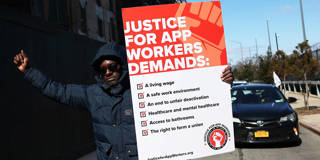Uber, Lyft, DoorDash, and other gig corporations have proposed several ballot initiatives in Massachusetts that would classify drivers and delivery people as independent contractors rather than employees. If they pass, these firms would have legal standing to continue depriving workers of basic employment rights and benefits.
WASHINGTON, DC – Uber, Lyft, DoorDash, Instacart, and other gig corporations are once again seeking the law’s blessing in the United States for their unscrupulous employment practices. Ahead of November’s election, these firms have proposed several ballot initiatives in Massachusetts that would empower them to classify drivers and delivery people as independent contractors rather than employees. (The Open Markets Institute, where I work, filed an amicus brief supporting a challenge to the constitutionality of the ballot questions.) As with Proposition 22 in California in 2020, Uber and other companies will probably spend lavishly to convince voters that these measures would benefit the affected workers and the public alike.
If Massachusetts voters endorse the ballot initiatives in November, these firms would have the freedom to rob workers of basic employment rights and benefits, including minimum wages, overtime pay, workers’ compensation, and unemployment insurance. It would also give gig employers a major – and manifestly unfair – competitive advantage over rivals and drive down labor-market standards. Instead of encouraging this exploitative business model, state and federal policymakers should force these companies to comply with the laws that apply to all employers.
Gig companies have misclassified their main workforce from the beginning, openly violating the law or exploiting its ambiguities. Uber and Lyft, for example, have insisted to regulators and the public that their drivers are independent contractors and thus not entitled to the rights and protections of employees, including the freedom to organize. These companies retain the control of an employer – Uber tells its drivers who to pick up and what routes to take, and sets their fares – while renouncing the responsibilities and costs of being one.

WASHINGTON, DC – Uber, Lyft, DoorDash, Instacart, and other gig corporations are once again seeking the law’s blessing in the United States for their unscrupulous employment practices. Ahead of November’s election, these firms have proposed several ballot initiatives in Massachusetts that would empower them to classify drivers and delivery people as independent contractors rather than employees. (The Open Markets Institute, where I work, filed an amicus brief supporting a challenge to the constitutionality of the ballot questions.) As with Proposition 22 in California in 2020, Uber and other companies will probably spend lavishly to convince voters that these measures would benefit the affected workers and the public alike.
If Massachusetts voters endorse the ballot initiatives in November, these firms would have the freedom to rob workers of basic employment rights and benefits, including minimum wages, overtime pay, workers’ compensation, and unemployment insurance. It would also give gig employers a major – and manifestly unfair – competitive advantage over rivals and drive down labor-market standards. Instead of encouraging this exploitative business model, state and federal policymakers should force these companies to comply with the laws that apply to all employers.
Gig companies have misclassified their main workforce from the beginning, openly violating the law or exploiting its ambiguities. Uber and Lyft, for example, have insisted to regulators and the public that their drivers are independent contractors and thus not entitled to the rights and protections of employees, including the freedom to organize. These companies retain the control of an employer – Uber tells its drivers who to pick up and what routes to take, and sets their fares – while renouncing the responsibilities and costs of being one.